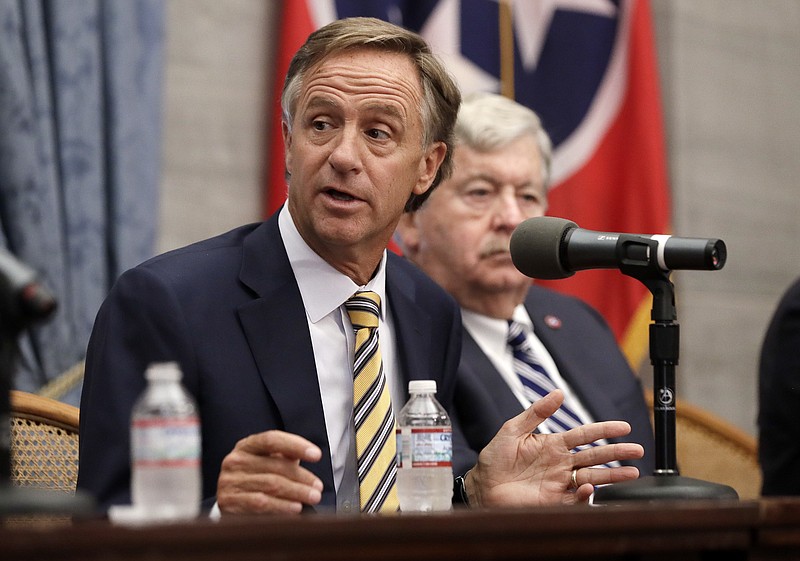NASHVILLE - Now that he's signed his own regulatory-based answer to last year's Hamilton County school bus crash into law, Tennessee Gov. Bill Haslam says he will explore whether Rep. JoAnne Favors' approach calling for mandatory seat belts on buses is "the right thing to do."
"We're going to continue to do work to say, 'Are they the right answer today?'" the governor said last week to reporters. "And if they are, then we'll figure out the financial piece. But as you know, there's quite a bit of disagreement about whether seat belts were the right thing to do just from a safety standpoint."
Haslam said the administration will study what other states have done on the issue.
Favors, a Chattanooga Democrat, said she's "very pleased that the governor is still expressing interest."

As amended, her House bill would have required all new public and private school buses come equipped with seat belts starting July 1, 2019. Sen. Todd Gardenhire, R-Chattanooga, sponsored the Senate version of the bill.
Favors' effort made it through four House panels but she took it off notice in the Finance Subcommittee late in the legislative session, recognizing it likely wouldn't pass the full committee.
Specially built seats and other features make buses one of the safest forms of child transport, but in recent years the National Transportation Safety Board and the head of the National Highway Safety Administration have called for three-point seat belts on school buses.
Haslam successfully pushed his bill, the product of a joint examination by the state's departments of Safety and Education he ordered after the Nov. 21 crash of a Woodmore Elementary School bus in Chattanooga.
Six children died and some two dozen others were injured in the crash. Parents and teachers had complained about bus driver Johnthony Walker, 24, who worked for the Hamilton County Department of Education's private contractor, Durham School Services.
Walker is awaiting trial on six counts of vehicular homicide, four counts of reckless aggravated assault and one count each of reckless driving, reckless endangerment and use of a portable electronic device by a school bus driver.
The driver, Durham and the county school system also face multiple civil lawsuits from families of children killed or injured.
Among other things, Haslam's approach requires each of Tennessee's 141 public school districts and public charter schools to name a transportation supervisor who would undergo annual training by the state. New bus drivers would have to undergo state training as well.
The law raises the minimum driver age from 21 to 25, and requires schools to investigate parents' and teachers' bus-related complaints within 48 hours and issue preliminary findings within 60 days.
Nearly 130 current bus drivers under age 25 will be grandfathered in.
Haslam's bill, which Favors co-sponsored in the House and Gardenhire carried in the Senate, easily passed the General Assembly with little discussion and no debate. The governor signed it May 4 and it will take effect Jan. 1.
But Favors' mandatory seat belt bill took a circuitous route in the House, encountering fierce opposition because of costs and questions whether it was necessary.
Just six states now require seat belts on schools buses. This year, lawmakers in at least 29 states, including Tennessee, introduced mandatory bus seat-belt bills, according to the National Conference of State Legislatures.
Favors' original bill required seat belts on all public and private school buses by July 1, 2023.
Legislative fiscal analysts said that because existing buses could not be retrofitted, the bill would cost the state $58.7 million and local systems an astronomical $423.4 million.
In response, Favors quickly amended her bill to say that all new public and private school buses purchased beginning July 1, 2019, come equipped with the three-point lap-and-shoulder seat belts recommended by the NTSB.
Her idea is to achieve the goal through normal bus attrition. Legislative analysts said 600 of the estimated 9,000 public and private school buses in Tennessee are replaced annually.
Favors said the belts should only add $2,000 to $3,000 to the cost of a new bus.
According to the National Highway Safety Administration, an average of four to six students die each year in school bus crashes. It was not clear how many students are injured. NHTSA already requires smaller buses under 10,000 pounds to come with the three-point seat belts.
As House panels debated Favors' bill some rural legislators relayed concerns from their own local bus drivers, who questioned how very young children could free themselves in an accident and how drivers could compel older ones to use the safety restraints.
And the lawmakers emphasized the safe nature of buses, which protect students with "compartmentalization" as well as higher, energy-absorbing seat backs and closely spaced seating.
But that doesn't work so well in side-impact and rollover crashes, according to the NTSB. And that's what happened on Talley Road on Nov. 21, according to city police.
Police said Walker lost control and the bus swerved to the right, struck an elevated driveway and mailbox, then swerved to the left and overturned, striking a telephone pole and smashing into a tree.
The NTSB investigated the crash but has not released its findings or issued recommendations.
Two pediatric physicians from Children's Hospital at Erlanger testified in the House Transportation Subcommittee they were confident seat belts would have prevented some of the severe blunt-force trauma the children suffered.
Favors and Gardenhire are planning to visit a bus seat-belt manufacturer's operation in Indiana later this year. And other bill sponsors, Favors said, want her to continue pressing it, as do parents, children, physicians and others.
"I think we'll be able to change some people's minds, some who are not 100 percent in support" as more information is brought forward, said Favors, who believes the bill can pass in 2018.
Contact Andy Sher at asher@timesfreepress.com or 615-255-0550. Follow on twitter at AndySher1.
